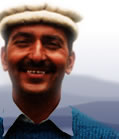 |
 |
||
 |
|||
|
RELATED THEMES education employment and income livestock social change OTHER LOCAL THEMES BACKGROUND |
migration Under the Mir's reign it was virtually impossible to leave Hunza and only a few Shimshalis - who either received permission from the Mir, or escaped - were able to. One man explains: "The situation improved when the Mir relaxed the immigration law a little bit and started granting the people rahdari (visa for travelling outside Hunza). The communication between Hunza and Gilgit then started… and more people started travelling" (Pakistan 3). The testimonies indicate that today a significant number of men from Shimshal migrate for both education and employment, and in more recent years a minority of women have also migrated to continue their education. Some men have moved their families with them - particularly for the sake of their children's education - while other wives and children have remained in Shimshal. Karachi is the favoured city for Shimshalis as it is considered cheaper than Islamabad and there is a larger Ismaili community established there. Several narrators who are currently living and working outside Shimshal with their families, claim they will definitely return once their children have grown up. Nowadays many men migrate on a seasonal basis to other parts of the Northern Areas to work as porters for trekkers and mountaineers; and some leave the village for shorter periods to accompany expeditions in the Shimshal area. Some narrators describe in detail their first journey out of Shimshal, and recall their initial impressions and experiences of things they had never seen before - tall buildings, vehicles, trains, expanses of flat land. For Asmat (Pakistan 3), this journey makes up a large and entertaining part of his interview. Amongst those narrators who have spent time living outside Shimshal, or even just visited cities, comparing life in the city and life in Shimshal is a popular topic. Aman (Pakistan 12) comments that: "…in a city…there are always anxieties, but in a village, life is safe and you can live without any danger… In a village no one remains hungry, because there is always someone's door opened to enter… But in a city the case is different, people living within the same roof are alien to each other…" Like Aman, many emphasise the unity, cooperation and peacefulness of the village as opposed to the stress, worry and expense of urban life. Although not all are entirely negative about their experiences in the city, Asmat quickly came to enjoy Karachi: "After three months' stay [in Karachi] I was so involved that I really didn't want to go back to Shimshal. I perceived Karachi as Janat (heaven), as the location was clean and I was also living neat and clean and would take fine foods… I came out of a farmer's life and was living a neat and clean life that is why, I liked Karachi" (Pakistan 3). Discussion on the impacts of migration is limited in this collection but there are references to its impact on agriculture. As in many rural mountain areas, male migration has increased the agricultural burden on women. Several narrators bemoan the lack of commitment to agriculture of some of the younger generation, who would prefer to work as porters to earn a cash income. Whilst in the short term the completion of the link road to Shimshal might lead to more migration, several narrators predict that in the long term it might reduce migration, in that better educational facilities and more economic and employment opportunities will be available in Shimshal: "The way of communication will be very fast and we might not need to settle in Gilgit with our children like me, because we would be able to get all the facilities here in Shimshal" (Pakistan 12). Another kind of seasonal migration involving people from many households is the annual migration with livestock to the pastures. Generally, one or more women from each household (and a few men) will take the main responsibility for the care of the livestock in the pastures and the production of dairy products for five months over the summer. quotes about migration"I spent 18 years in Karachi. When my children become able to live on their own with my husband then I thought that I should go back to my village to start our routine work. Because we were only in the city for the education of our children and we never thought to live permanently in Karachi. That is why I came back to Shimshal three years ago… but without a man you cannot do all the agricultural and other works… I am fortunate enough that the villagers are helping me in each and every sphere of life… My husband will spend a year or two in Karachi with our sons and then he will come back to Shimshal." "So I have also left my lands due to my job, because I have been posted to Gilgit and I couldn't manage both things, that is my home and my job. I couldn't manage to leave my children in Shimshal and live alone in Gilgit. In the beginning when they were in Shimshal, sometimes I couldn't even support them… My wife was alone in Shimshal to look after our lands and everything, and it was very difficult for her to manage everything alone and that is why migrated from Shimshal and decided to live in Gilgit… And there is a possibility that when my children grow older, then they could live in a hostel and I would again get the chance to go back to Shimshal, because I like Shimshal very much." "…when a person starts his city life, he develops his thinking accordingly. But the villagers…think that these people coming from the cities play with them. And this approach is due to the generation gap, because if one thinks or talks about something and others couldn't understand his ideas, this can create a problem. But anyhow if one left his village and migrates to the city this doesn't mean that he starts thinking negatively for his village. I think he will always keep positive thinking for his village and try to bring better things for his village." "In 1973 we were about 70 people [from Gojal living in Karachi] and along with guests it used to be around 80 in all. At that time we used to live with unity and love, helping and taking care of each others' needs. We never used to think that anybody was from any different village or town etc… Whenever any friend used to come from Gulmit, Shimshal or Passu or from any other village we always used to go and click a photograph in "Flux" a famous studio at Nazimabad. The interesting part of his studio was that there were always ties, check shirts and coats made readily available and we used to put them on in turns to have our pictures taken. With this situation you will realise our shortage of clothes in those days. I think about 101% of us had pictures taken wearing the same red tie, check shirt and black coat…" "…after two and three years I badly missed my native town, my village. The calmness, the sincerity of the people and the love for each other - those were the things that I badly missed in Karachi. Because in an urban society you can very well imagine that people are very selfish… they don't have any affinity, any sincerity, if they provide anything as a service, they can expect a reward… But in Shimshal people are providing services to each other without any reward, without any...just whatever they have they can just offer to you if you are in need, if you ask." "I was taken around the famous places of Karachi but it neither inspired me nor provided me with mental peace and satisfaction. I would always think about my home (Shimshal) and the pending works that I had to do at the village… Though I lived in Karachi for about one and half years, my thoughts were dominated by the household affairs of Shimshal. Farman would always feed me the best food he could afford… but I deemed it not better than the dry crispy bread of my village. The mental peace that we have in the village is extinct in the city. In the city we have the major problem of language. We cannot converse with the people in the city." |
|